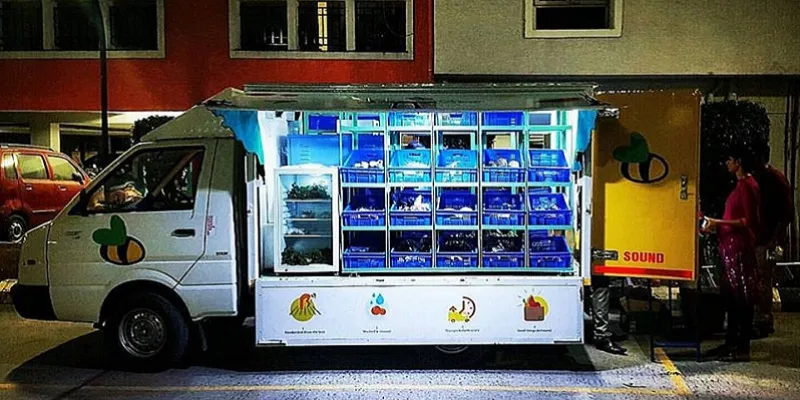From farm to fork, SunnyBee gets you get the freshest produce every day
Identified with direct-from-source products, Chennai-based SunnyBee is building a low-on-wastage logistics and supply chain in the fruits and vegetables business.
Every Sunday, Sujatha Krishnan wakes up at 7am and heads to the farmer’s market, 10km from her home. The drive is long, but it’s worth the effort because it means she gets farm-fresh produce for the week.
Most of us like fresh fruits, vegetables and farm produce, from farms to kitchens, but don’t know how to get the supply in place.
Enter SunnyBee. A branded fresh produce supply chain company, it brings the freshest fruits and vegetables from farmers to consumers.
The startup was launched by 23-year-old Sanjay Venkat Dasari, and he was soon joined by Karthik Jayaraman, 42; Vignesh Kumar Manogaran, 32; Sendhil Kumar Natarajan, 43; and Subramanian Akkulan, 45.
“It was a lucky coincidence. I was nearing the end of my college education, and, at 21 years of age, knew I wanted to try my hand in the startup space. I experimented with some restaurant and food truck ideas, but nothing was truly interesting enough for me to commit,” Sanjay says.

Building the idea
Sanjay had always been intrigued by companies with a social purpose, especially those also heavily engaged in marketing and branding-related activities.
At the same time, Karthik, now Co-founder and CEO of SunnyBee, was keen to leave his corporate job and explore if the learnings he had over nearly 20 years in the automotive and industrial sectors could make an impact in unorganised sectors such as agriculture.
The duo decided to join hands and work together. After research, they realised that there was a massive opportunity in the fruits and vegetables industry to introduce some structure and transparency.
Sanjay says the duo was also looking at being a part of a startup that lead to social impact.
“We built our model to specifically find ways to enhance the livelihood of small-holding farmers around India using market mechanisms that encouraged fair trade. From there the model evolved and pivoted multiple times, but stayed true to its original vision,” Sanjay says.
The workings of SunnyBee
The SunnyBee platform has a portfolio of over 250 fruits and vegetables. Majority of these are sourced from their network of over 150 partners over nine states, who work with a network of over 15,000 farmers.
“Our farm supply partners include professional aggregators, farmer producer companies and individual farmers. We have built ability to deep source produce that is difficult to obtain or handle seasonal fruits, exotic vegetables and rare greens,” Sanjay says.
The produce is brought from these sources by trucks (with storage solutions) to distribution centres in Chennai.
Sanjay says the produce is usually graded, segregated and packed, as per client requirements at the centre and distributed to clients across Chennai and other parts of Tamil Nadu.
“Our DC is partly mechanised and features several elements designed to minimise shortfall or confusion, and deliver produce precisely as per customer requirements, with minimal human effort. We are transferring our learnings from the automotive industry into this DC, by putting in place FIFO (first-in-first-out) solutions, Poka Yokes and visual control solutions to minimise errors and make the process bug-free,” Sanjay says.
The team claims to serve over 80 clients across a wide variety of segments, including hotels, restaurants, modern trade outlets, general trade centres and institutional sales. SunnyBee claims to handle approximately 20 tonnes of fresh produce every day.
A convenience store format for Indian conditions
The team also offers a unique model of “SunnyBee certified outlets” – premium branded outlets for fresh produce similar to Trader Joe’s or Whole Foods in the US, but in a convenience store format to suit Indian cost structures.
These operate in a number of models under various partnership arrangements. SunnyBee has 12 outlets across Chennai and is expanding this network quickly. These outlets help reach their branded produce directly reach over 5,000 customers, and also serve as mini distribution centres.
SunnyBee captures or predicts orders from clients, which are then sent to supply partners in the form of purchase orders (POs). Trucks are sent to the farms as guided by partners, to pick up stock from their location.
Produce is directly loaded into crates and, where required, protected with specific life-extension solutions. The produce is graded and weighed at the farm gate or at the partner collection centre, so that farmers have clarity on payments due to them – the team pays FPOs within three days of invoice receipt, and their professional aggregator partners, within seven days.
Once the stock is picked up, the team transports it hygienically and efficiently to minimise wastage and re-handling in transport.
“We split the stock at our distribution centre with minimal re-handling and transfer to our stores or customers as quickly as possible,” Sanjay says.
Also read: How agritech startup Truce is helping farmers have a field day and reaping the benefits
Picking and packaging the best of produce
Produce with limited shelf life is not stored – SunnyBee has been able to run ultra-fast supply chains, some as short as five hours from harvest to shelves, and is constantly working to make all supply chains shorter and faster.
Post-picking, produce is loaded into their fleet of vehicles and delivered to clients.
“We are working on tracking technologies so we can keep our clients informed in real time on delivery status, as well as do dynamic rescheduling of routes given the uncertainties prevalent on our roads,” Sanjay says.
The task, however, isn’t easy because the segment – on the consumer and the producer side - is highly fragmented. At scale, the opportunity available in buying, re-segregating and distribution is obvious and very tempting. The challenge lies in getting to that scale.
“During startup, companies lack the scale to buy out the complete produce of a farmer. This makes farmers reluctant to work with companies. Procuring from the mandi squeezes out margins. Scaling up through aggressive discounting is also not advisable as it results in high burn without necessarily creating loyalty. Getting a virtuous scaling cycle cranking was one of the first challenges we faced,” Sanjay says.
But working with organisations like the National Agro Foundation and Commonwealth of Learning helped SunnyBee.
Another challenge the team faced was ensuring that the fruits and vegetables remained fresh.
Each item needed a different set of SOPs.
“We have built a team of industry veterans with the expertise to drive this. In addition, we are very quick off the block in experimenting with new technology in this area, be it ethylene absorbers, modified atmosphere packing etc. At the same time, we have been working to ensure that the cost of these solutions suits the Indian cost structure for this category,” Sanjay adds.
The expectation of clients requires a very high degree of responsiveness, but the cost structure of the industry does not support excessive expenditure, for example in last-mile distribution costs. Hence, there is a constant pressure to trade between cost efficiency and responsiveness.
“Selecting the right transport solution and routing answers, and automating the scheduling process are some of the areas we are working on,” he adds.
SunnyBee is experimenting with electric bikes for last mile delivery up to certain weights.
“On scheduling, IoT solutions are showing promise, and we are working with partners to see if this technology can be used for dynamic scheduling,” Sanjay says.
What’s cooking in the agritech kitchen?
SunnyBee buys, transports, adds value and sells produce, and the revenues come from their sales. The team claims that the number of clients served has grown from just five last March to close to 80. In addition, the number of certified outlets has grown from two to 12.
“Our supply partner base has also grown from just 2 partners when we started to nearly 150 partners now,” Sanjay says.
There are a growing number of agritech players looking deeply into bringing a technological edge into the sector. And understandably so for even today 22 percent of India’s GDP comes from the agriculture sector. There also are several players who have invested in the space, thanks to government initiatives and schemes.
There are several players in the field of bringing fresh produce from the farm to the plate, including BigHaat, Truce, CropIn, Agrostar and Ninjacart.
In March this year, SunnyBee raised funding of $2.7 million from Aspada Ventures.
“We intend to scale up operations in Chennai to cover more consumption channels, and launch operations in Bangalore and Hyderabad during the next financial year. Simultaneously, we will drive deeper into the hinterland for our sourcing. Finally, we will invest in technology to ensure that physical and information transfer across this supply chain is made error proof and efficient,” Sanjay says.







